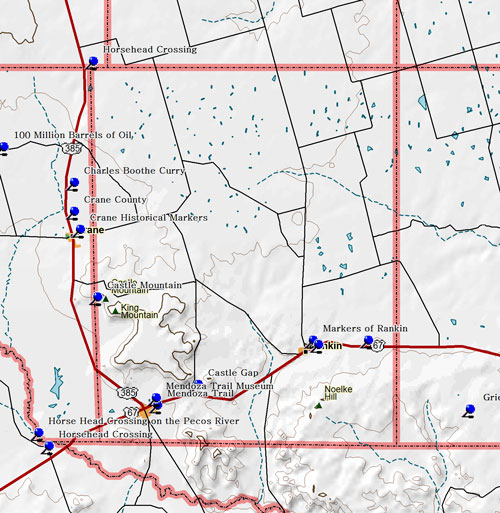|
Marker Title: Castle Gap
Address: US 67, E of McCamey
City: McCamey
County: Upton
Year Marker Erected: 1962
Marker Location: On US 67 about 5 miles E of McCamey
Marker Text: Castle Gap, famous early pass for southwestern trails, lies 14 miles northwest along the Upton-Crane County line. Through this mile-long gap between Castle and King mountains flowed the full panorama of Texas history-- Indian, Spaniard, Stage and Trail Herd Driver, Settler, '49er. In prehistoric time Castle Gap was a landmark for nomadic Indian tribes and later guided the Commanches on their war trail into Mexico. The first white man to discover the pass was probably the Spanish explorer Felipe Rabago y Teran in 1761. Then came the '49ers in their frenzied rush to the California gold fields, to be followed by other, more permanent settlers. From 1858 to 1861 the famed Butterfield Overland Mail coaches rumbled through the pass on their 24-day journey from St. Louis to San Francisco, pausing briefly at the adobe-walled Castle Gap station for fresh teams. Then they were off again, fording into the sunset. By 1866 the Goodnight-Loving cattle trail was firmly established at the gap, funneling tens of thousands of brawling longhorn cattle to the northern markets. During this same period, legend holds that a treasure-laden aide of Emperor Maximilian of Mexico, fleeing the country when the regime collapsed, buried gold and jewels in the area. Dust of the pioneers settled long ago. Today Castle Gap slumbers peacefully, disturbed only by visitors, occasional treasure hunters and those who probe for ruins of the Butterfield station and the rapidly fading ruts of coach and wagon.
Marker Title: Mendoza Trail
Address: US 67, in Santa Fe Park
City: McCamey
County: Upton
Year Marker Erected: 1967
Marker Location: On US 67, Eastern edge of McCamey in Santa Fe Park
Marker Text: Route taken, 1683-1684, by the party of Lt. Gen. Juan Dominguez de Mendoza, whose purpose was to explore the Pecos Plains, obtain pearls from Texas rivers, and Christianize the Jumano Indians. Starting 12 miles below El Paso, the party of 35 traveled first southeast, then northeast into Texas, Crossing future Upton County. They found many pearls near present San Angelo; and at the confluence of the Concho and Colorado rivers, they founded San Clemente Mission. Two centuries later, part of Mendoza's route was taken by the Goodnight-Loving cattle trail. Recorded Texas Historic Landmark, 1967.
Museum Name: Mendoza Trail Museum
Mailing Address: P.O. Drawer B
City: McCamey
Zip Code: 79752
Street Address: Santa Fe Park Hwy 67 E
Area Code: 915
Phone: 652-3192
County: Upton
Types of Exhibits/Collections: Science, Military, Natural History, Archeology, Photos, Historical, Local/Pioneer History
Museum Name: Rankin Museum
Mailing Address: P.O. Box 82
City: Rankin
Zip Code: 79778-0082
Street Address: 101 W 5th S of Hwy 67
County: Upton
Types of Exhibits/Collections: Art, Military, Archeology, Photos, Historical, Local/Pioneer History, Archives
Marker Title: Upton County
Address: US 67, East of Rankin in roadside park
City: Rankin
County: Upton
Year Marker Erected: 1936
Marker Location: On US 67, about 6 miles E of Rankin in roadside park.
Marker Text: Formed from Tom Green County created February 26, 1887 - organized May 7, 1910. Named in honor of John Cunningham Upton 1828-1868. A distinguished Confederate officer killed at Manassas, August 30, 1862. County Seat, Upland, 1910-1921; Rankin, since. A cattle and sheep raising county, oil wells dot the county.
Marker Title: John C. Upton and His Brother, W.F. Upton
Address: 10th and Rankin St.
City: Rankin
County: Upton
Year Marker Erected: 1963
Marker Location: Courthouse Lawn, (corner of 10th and Rankin Sts.) Rankin.
Marker Text: County named for Texas Confederates (Star and Wreath). Colonel John Cunningham Upton (1828-1862) Born Tennessee. Came to Texas 1859. Raised company outbreak of Civil War. Attached to 5th Texas Infantry, Hood's famed Texas Brigade, fighting in the campaigns in and around Virginia. Rose to Lt. Colonel of his regiment. The day before his death at the Battle of Second Manassas, led charge upon the enemy rear guard which was a seldom seen, yet brilliantly executed move. Colonel William F. Upton (1832-1887) Born Tennessee. Came to Texas 1853. When Civil War broke, enlisted Texas state troops mustered in for Texas frontier protection. He served in various military units in Texas, helping to successfully guard the 2000 miles of frontier and coastline open to Union or Indian attack. Promoted to Lt. Colonel of Mann's regiment, stationed in Galveston area along with other Texas troops to prevent expected mass Union invasion in 1865. Member of State Legislature 1866, 1876-82.
|

